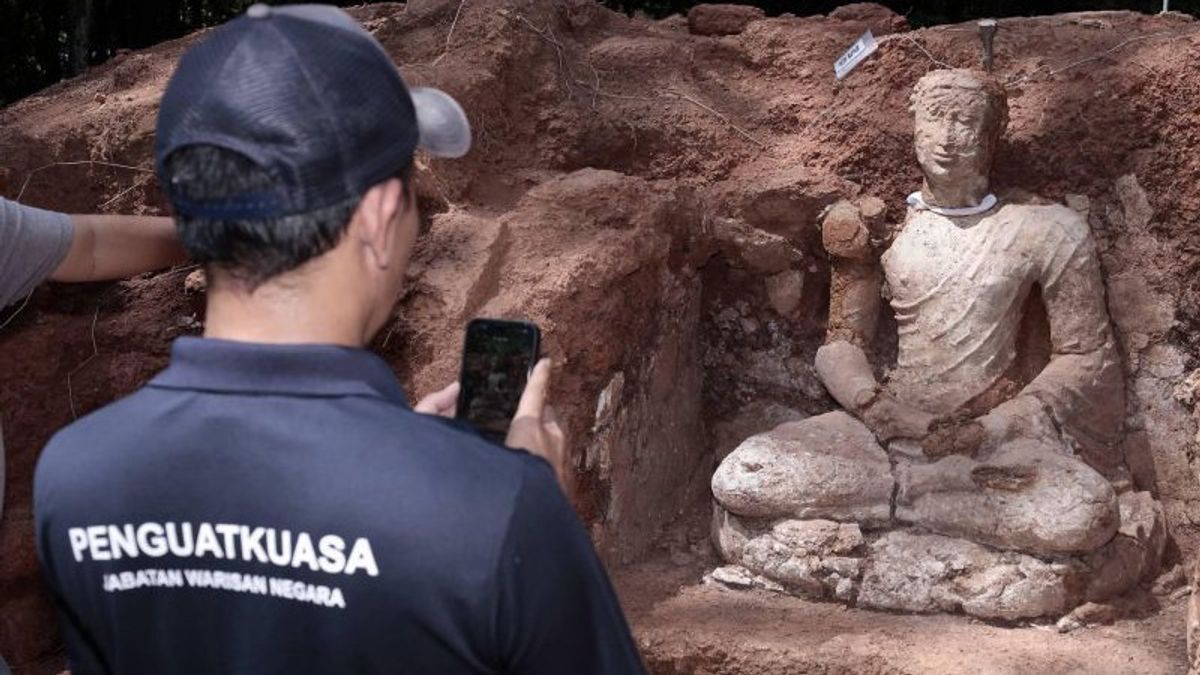JAKARTA - The research team found a complete human-shaped statue that is believed to be a Buddhist statue and is thought to date back to the 7th or 8th centuries at the Archaeological Heritage Site of Bukit Choras, Yan, Kedah, Malaysia.
Researchers from the Center for Global Archaeological Research (PPAG) and the University of Science Malaysia (USM) have found the statue while conducting phase III research which took place from April 21 to May 21, 2024.
"Human-sized Buddhist statues in a scalar sitting position are made of the stuko mixed with lime, water and sand, found on the northern wall of the Bukit Choras Temple," said the Ministry of Tourism, Arts and Culture of Malaysia (MOTAC) in a message obtained in Kuala Lumpur, Antara, Friday, June 28.
Different from the findings in stages I and II, the statue was found complete with an iconographic head and characteristics such as a robe, facial expressions and clothes clearly visible.
The researchers also found the Sanskrit inscription that was imprinted on the stone body and shards of earth pottery. Until stage III, three inscriptions have been found.
The newly discovered inscription contains the Sagaramatipariprccha mantra, telling the story of Buddhist teachings closely related to vacancies, the causes and properties of Buddha, just like the contents of the inscription found in stage I research.
Phase III archaeological research has also revealed the structure of the buildings on the north and west walls of the temple so that it is clearly visible that the master structure of the building has a unique architecture.
A more careful study of stratography, contour mapping, and documentation is carried out on temple structures and later blocks are found.
As a measure of further security and research, the Buddhist statue was taken off the site on the Bukit Choras Site and temporarily placed in the laboratory of the Global Archaeological Research Center, USM for comprehensive conservation work.
Secretary General of the Malaysian Ministry of Tourism, Art and Culture Roslan Abdul Rahman in his statement to the media said the relic was thought to date back to the 7th century or 8 masehy so that it is estimated that it is older than the discovery in Angkot Wat, Cambodia, or in Borobudur, Indonesia.
According to him, a comparative study between the newly discovered statues and other statues, particularly from Indian, Indochina, and Malay Islands civilizations, can provide an important picture of the people of the Old Kedah, especially from aspects of religion, culture, and their relationship in terms of art and technology with the outside world.
Meanwhile, the discovery of other Sanskrit inscriptions shows the importance of Bukit Choras as a religious site.
The latest discovery at the Bukit Choras Archaeological Site opens up a new space for interpretation of the geostrategic position of Kedah Lama as an important city for Southeast Asia maritime trade. The research also confirms the commitment given by MOTAC through JWN and USM in producing new data to enrich history and preserve the wealth of the state heritage.
SEE ALSO:
The English, Chinese, Japanese, Arabic, and French versions are automatically generated by the AI. So there may still be inaccuracies in translating, please always see Indonesian as our main language. (system supported by DigitalSiber.id)
Most Popular Tags
#Prabowo Subianto #golkar #OTT KPK #Pilkada Dki #online gamblingPopular
27 November 2024, 05:00
27 November 2024, 02:00


















